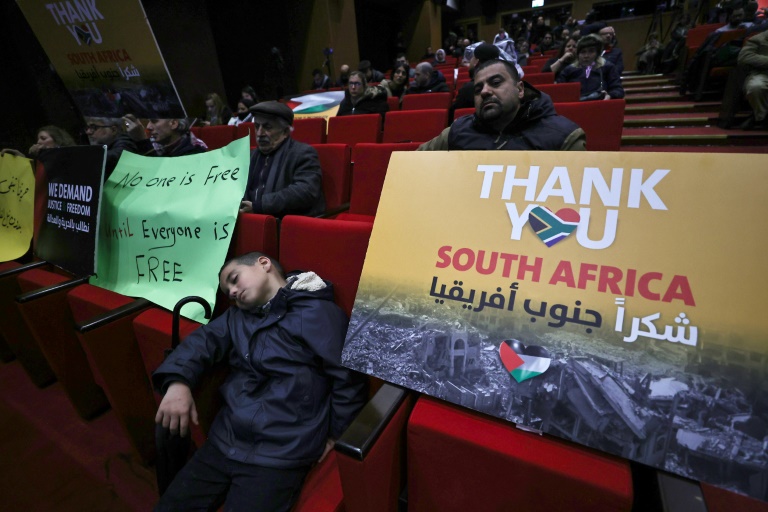Palestinians trapped in the grip of war were caught between feelings of pride and frustration on Friday following the UN’s top court saying Israel must prevent genocide in Gaza.
In the Palestinian territory’s southern city of Rafah, more than a million displaced people are struggling to survive amid bombardment and severe shortages of basic supplies.
Some who had access to electricity gathered around a television Friday to watch the International Court of Justice make an initial ruling on the genocide case brought by South Africa against Israel.
“I feel proud of the court’s decision, it’s the first time that the world’s telling Israel that it crosses all lines and international law,” said Maha Yasin, who was forced to flee from the northern Gaza City to Rafah.
“At least I feel that the world has started to feel for us, and that our blood, our martyrs, our physical and mental loss is not in vain,” the 42-year-old told AFP.
More than 26,000 people have been killed in Gaza, about 70 percent of them women and children, according to the health ministry in the Hamas-run territory.
The war erupted on October 7 with an unprecedented Hamas attack which resulted in about 1,140 deaths in Israel, mostly civilians, according to an AFP tally of official Israeli figures.
Militants also seized about 250 hostages and Israel says around 132 of them remain in Gaza, including the bodies of at least 28 dead captives.
The Israeli military has laid to waste swathes of Gaza in its blistering assault, with 1.7 million people forced to flee their homes according to the United Nations.
Abu Mohammed Zaqout, 55, reached Rafah with dozens of relatives who were crammed into a tent unfit for the harsh winter weather.
“I was pinning my hopes on the court ordering a stop to the war,” he said.
“But I am happy that I lived to see the day when the world is saying to Israel that it is criminal and its war unethical,” added Zaqout.
The ICJ’s landmark decision also said Israel must facilitate “urgently needed” humanitarian aid to Gaza, where the limited number of trucks that enter are often swamped by people desperate for food.
Zaqout supported the court’s ruling, but said it would not be enough to stop the suffering.
“We need to see an end to the war on the ground. No one can bear it anymore,” he told AFP.
The court session was closely watched around the world and in the occupied West Bank, where residents gathered at a cinema in Ramallah.
“Thank you South Africa” placards were on display, but attendees were disappointed the court stopped short of ordering an immediate halt to hostilities.
“It is unacceptable for the world to stand today — after more than a hundred days — and still watch, and not make an immediate decision to stop the fire, bring in food and medicine, and evacuate the wounded,” said Hala Abu Gharbiyeh, with a South African flag in her hand.
A metres-high statue of South Africa’s anti-apartheid hero Nelson Mandela stands in Ramallah, while earlier this month Palestinians raised the country’s flag over the West Bank city of Bethlehem.
Back at the cinema, Palestinian Mais Shabana said she was disappointed with the court’s response to the South Africa case.
“We were very optimistic, but now we are not happy. We feel that the court could have clearly decided that there would be a ceasefire,” she said.







